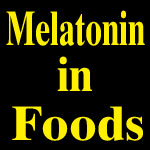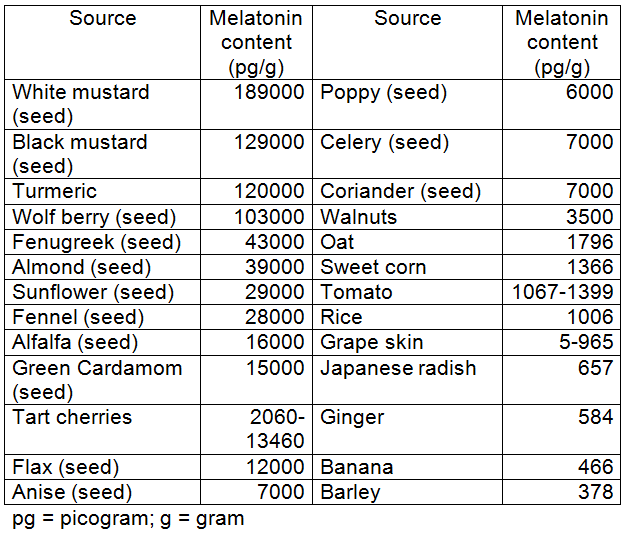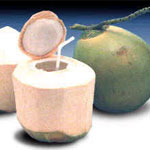
|
Associate Professor Vimol Srisukh Department of Food Chemistry, Faculty of Pharmacy, Mahidol University. |
|
| 57,652 View 1 hours ago | |
| Publication date: 2015-09-30 |
Melatonin in the body
Oxidative stress is an imbalance between the production of reactive oxygen species and antioxidant defenses. It is involved in several pathological conditions including aging. Melatonin is a hormone produced by pineal gland in the brain, according to a circadian rhythm, with a maximal secretion at night. The melatonin level in the blood ranged from 10 to 60 pg/mL during day and night, respectively. Since melatonin is both hydrophilic and lipophilic, it is different from other antioxidants that it can cross physiological barriers in order to reduce oxidative damage in both lipid and aqueous cell environments.
Melatonin as a dietary supplement
Melatonin, as a dietary supplement, has been popularly used in jet lag; melatonin was reported to synchronize the sleep/wake cycle and alleviate the symptoms. Melatonin has also been used for insomnia in the elderly, etc. Other beneficial effects such as antioxidant, anti-inflammatory activities have been reported as well. The typical low oral dose range used is 1-5 mg. Higher doses, which have been reported in other clinical studies such as anticancer studies, are in the range of 10-40 mg.
Melatonin in foods
Melatonin could also be found in several foods and plants. Its variable presence has been reported in roots, leaves, fruits and seeds of plants. Increasing melatonin intake from foods might increase the melatonin level in blood plasma and could be of a therapeutic potential. Melatonin may exhibit the antioxidant activity synergistically with other antioxidants in plants. Clinical studies have shown that melatonin could be efficient in preventing cell damage, metabolic and neurodegenerative diseases, cancer, inflammation and aging. Some of the dietary sources of melatonin are listed in the following table. 
Reference
- Bonnefont-Rousselot D, Collin F. Melatonin: Action as antioxidant and potential applications in human disease and aging. Toxicology 2010;278:55-67.
- Brezinski A. Mechanism of disease: melatonin in humans. N Engl J Med 1997;336:186-95.
- Burkhardt S, Tan DX, Manchester LC, Hardeland R, Reiter RJ. Detection and quantification of the antioxidant melatonin in Montmorency and Balaton tart cherries (Prunus cerasus). J Agri Food Chem 2001;49:4898-902.
- Chen G, Huo Y, Tan DX, Liang Z, Zhang W, Zhang Y. Melatonin in Chinese medicinal herbs. Life Science 2003;73:19-26.
- Dahlitz M, Alvarez B, Vignau J, English J, Arendt J, Parkes JD. Delayed sleep phase syndrome response to melatonin. Lancet 1991;337:1121-4.
- Dubbels R, Reiter RJ, Klenke E, Goebel A, Schnakenberg E, Ehlers C, Schiwara HW, Schloot W. Melatonin in edible plants identified by radioimmunoassay and by high performance liquid chromatography-mass spectrometry. J Pineal Res 1995;18:28-31.
- Haimov I, Lavie P. Melatonin-a chronobiotic and soporific hormone. Arch Geronto Geriatr 1997;24:167-73.
- Hattori A, Migitaka H, Iigo M, Itoh M, Yamamoto K, Ohtani-Kaneko R, Hara M, Suzuki T, Reiter RJ. Identification of melatonin in plants and its effects on plasma melatonin levels and binding to melatonin receptors in vertebrates. Biochem Mol Biol Int 1995; 35:627-34.
- Korkmaz A, Reiter RJ. Epigenetic regulation: a new research area for melatonin? J Pineal Res 2008;44:41-4.
- Korkmaz A, Topal T, Tan DX, Reiter RJ. Role of melatonin in metabolic regulation. Rev Endocr Metab Disord 2009;10:261-70.
- Manchester LC, Tan DX, Reiter RJ, Park W, Monis K, Qi W. High levels of melatonin in the seeds of edible plants: possible function in germ tissue protection. Life Sci 2000;67:3023-9.
- Pape C, Luning K. Quantification of melatonin in phototrophic organisms. J Pineal Res 2006;41:157-65.
- Paredes SD, Korkmaz A, Manchester LC, Tan DX, Reiter RJ. Phytomelatonin: a review. J Exp Bot 2009;60:57-69.
- Petrie K, Dawson AG, Thompson L, Brook R. A double-blind trial of melatonin as a treatment for jet lag in international cabin crew. Biol Psychiatry 1993;33:526-30.
- Reiter RJ. The pineal and its hormones in the control of reproduction in mammals. Endocr Rev 1980;1:109-31.
- Reiter RJ, Tan DX, Gitto E, Sainz RM, Mayo JC, Leon J, Manchester LC, Vijayalaxmi, Kilic E, Kilic U. Pharmacological utility of melatonin in reducing oxidative cellular and molecular damage. Pol J Pharmacol 2004;56:159-70.
- Reiter RJ, Manchester LC, Tan DX. Melatonin in walnuts: Influence on levels of melatonin and total antioxidant capacity of blood. Nutrition 2005a;21:920-4.
- Reiter RJ, Tan DX Maldonado MD. Melatonin as an antioxidant: physiology versus pharmacology. J Pineal Res 2005b;39:15-6.
Recommended articles

|
Young Coconut Water: The functional drink from nature 1 hours ago |
|
|
Preservatives in sausages, ham, and bologna 1 hours ago |

|
Stevia: Natural sweetness...sweetener of choice 1 hours ago |

|
Thai Traditional Medicine Theory in Relation to Seasons Part 2 1 hours ago |

|
Top 10 Selenium-Rich Foods & Health Benefit 2 hours ago |

|
Drugs that should be avoided in patients with dementia 2 hours ago |

|
Top 10 Potassium-Rich Foods & Health Benefit 2 hours ago |

|
Thai Traditional Medicine Theory in Relation to Seasons Part 1 3 hours ago |

|
Food allergy in children:a brief information for new parents 3 hours ago |

|
Trans-fatty acids in fried foods and baked foods 3 hours ago |
